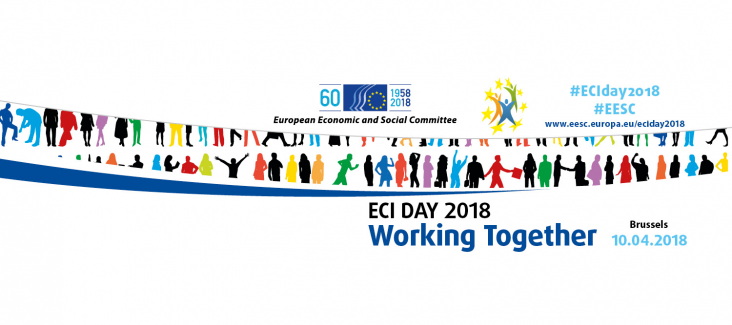This year’s ECI Day had the theme “Working Together”. Following last year’s announcement by the European Commission of a reform of the ECI, this year, participants and speakers were asked to put forward suggestions for improvement of the ECI. One thing quickly became clear again: the ECI as an instrument of citizen participation needs some changes.
The first half of the day was dedicated to the high-level political stage. After the opening speech by Georges Dassis, President of the EESC, representatives of the three EU institutions and the European Ombudswoman, Emily O’Reilly, gave their input. The moderator Irini Pari, President of the EESC’s ECI ad hoc group, addressed the existing political will, which was also expressed by the speakers. It was striking that all speakers stressed their own efforts to revise the ECI and saw the ECI as a way to bridge the gap between the EU and citizens.
After all, the EU would only make progress through the participation of EU citizens. Especially considering today’s EU dilemmas, citizen participation is of great importance. But an essential problem is the lack of knowledge of citizens about their opportunities to participate. To remedy this situation, Frans Timmermans, the first Vice-President of the European Commission, announced the implementation of the information campaign “EU Take the Initiative.” In addition, a new website, a European Citizens’ Initiative Forum, will go live where citizens can inform themselves, exchange information and make contact in order to launch their own initiatives. Another aspect, which was mentioned several times, was the Commission’s proposal to reduce the age to 16 years for the signing of initiatives. This will include European youth, which are very important as connoisseurs of the digital world.
However, this potential can only be realised if the ECI is made more user-friendly and the signing of an initiative is simplified. The issues of data security and transparency were also discussed. Both are important points that must be assured to citizens.
After the politicians’ speeches, a Q&A session followed, which was divided into two parts. First, representatives of the ECI organizing partners asked questions to the panel. Afterwards, the floor was open for questions. In the next phase of the event, Julian Vankov, representing the Bulgarian Council Presidency, and Hubert Fuchs, Austrian State Secretary, also had the opportunity to make a contribution on the subject. While Vankov presented technical details, Fuchs emphasized the Austrian tradition of the referendum, which will benefit the ECI during his country’s presidency.
After the lunch break, the focus was on concrete proposals for improvement from selected speakers. In addition to Josep-Maria Terricabras, Member of European Parliament, Dr. James Organ, legal expert for the EESC’s ECI report, and Daniela Vancic of Democracy International, ECI organisers were invited to make their views known. Criticism was voiced above all at the follow-up process after the achievement of one million signatures. At present, this is not acceptable and the initiatives receive too little attention. The lack of political recognition must be the focus of the reforms. This should not only focus on successful initiatives, but should also include initiatives with fewer signatures. The Commission was asked to take more account of citizens’ concerns and to take them into account in its political action. Also discussed were the user-friendliness, which could still be improved, and the lack of awareness of the ECI, where Daniela Vancic called the ECI a “watermill without water.”
In one of three workshops in the afternoon, the Commission’s new online collaborative platform, which Timmermans had introduced in the morning, could finally be tested. The website was developed in cooperation with ECAS, who selected Democracy International as the fundraising and campaigning expert advisers. During the hands-on workshop, some technical problems were identified and also details of content were criticized. It was proposed to integrate informational videos and to simplify user networking. The collaborative platform will be launched this month, April 2018, and will immediately aim to help organizers in their ECI goals.
Overall, ECI Day 2018 showed that the ECI is a decisive element in reducing the gap between citizens and the political level. If the points of criticism are ignored, it leads in the long run to frustration and discouragement of citizens. Ultimately, it is crucial to work primarily on awareness and political impact of ECIs. The suggestions for improvements and comments made at the conference should be included in the reform decisions. However, it should not be overlooked that this is a long process that needs much time.


